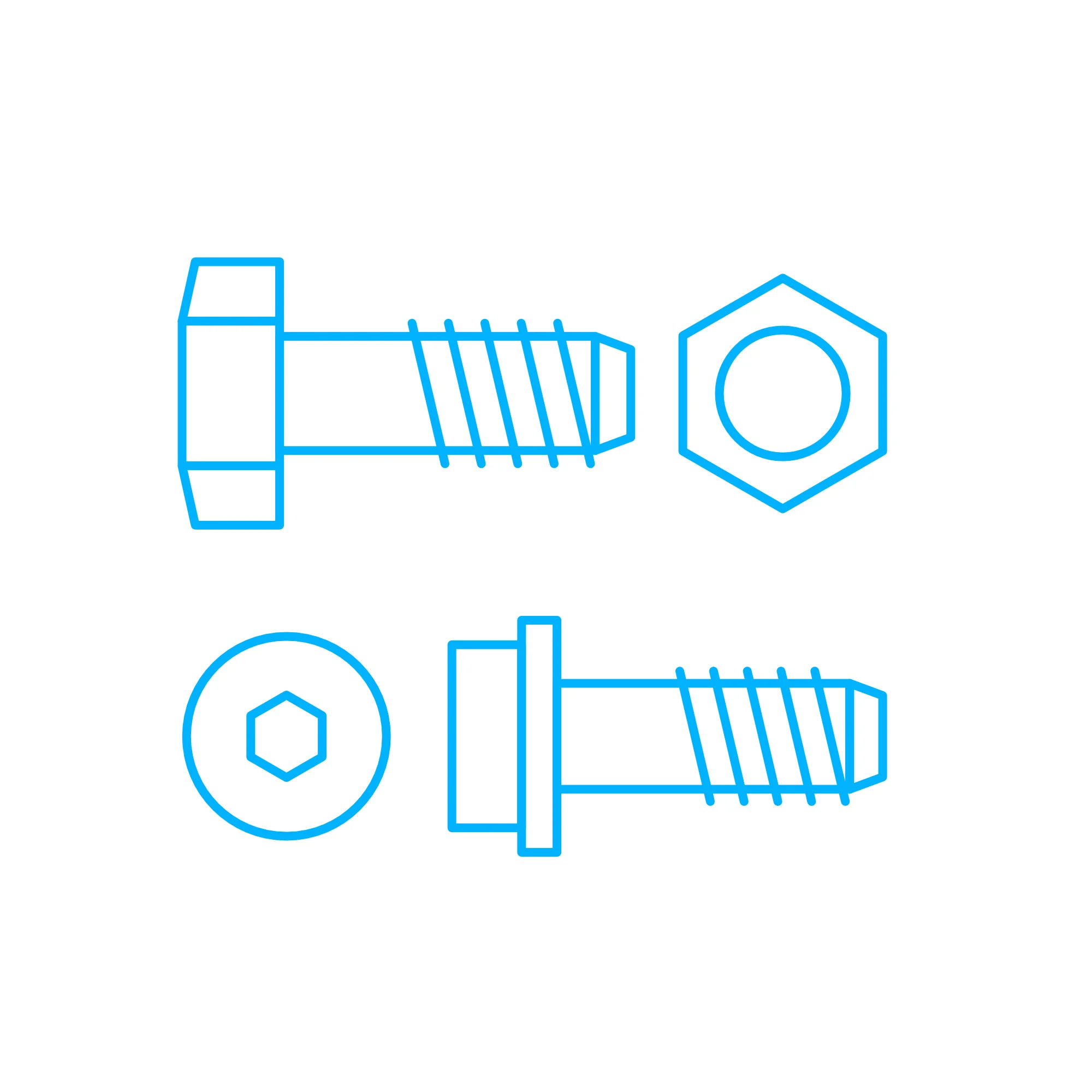HEX SHOULDER STUD Screws for high‑duty marine and diesel engines
Screws are precision fasteners that create and sustain clamping forces inside engines. From cylinder heads and main bearing caps to turbochargers, manifolds, accessories, and vibration mounts, they hold critical interfaces together while engines operate under heat, pressure, and constant cyclic loads. Within this category, a HEX SHOULDER STUD stands out as a locating and clamping element, combining a hex drive with a precision shoulder to align components while delivering the required preload. In large industrial, diesel, and marine engine environments, selecting the right screws is fundamental to performance, uptime, and safety.
Engine screws must do far more than simply “hold parts.” They convert tightening torque into axial tension, resist fatigue, maintain sealing, and preserve geometry across thermal cycles. Their design, materials, surface treatments, and tolerances are engineered to ensure predictable clamping over thousands of hours. Whether you are maintaining a propulsion set, a genset at sea, or a stationary gas engine, dependable screws—including the highly specialized HEX SHOULDER STUD—are central to reliable operation.
Technical function of screws and HEX SHOULDER STUD in diesel engine and marine engine assemblies
The primary job of a screw is to generate and sustain preload. During tightening, torque is converted into bolt stretch, producing clamping force that keeps joint surfaces in intimate contact. Stable preload preserves gasket compression, prevents fretting, and safeguards alignment of rotating and reciprocating groups. In a marine engine or a high-output diesel engine, stable preload is mission-critical: fluctuating combustion pressures and vibration continuously try to separate joint faces, and only the correct screw specification resists that dynamic separation.
A HEX SHOULDER STUD adds a precision shoulder that serves as a locating feature. The shoulder carries shear loads, improves repeatability of alignment, and protects threads from side loads. Typical placements include cylinder heads, main bearing ladders, gear housings, turbocharger casings, and accessory brackets. The hex feature enables controlled installation and removal in tight spaces, supporting consistent torque or torque‑angle procedures. When specified as OEM parts, a HEX SHOULDER STUD is dimensioned to the mating bores and counterbores for true position, ensuring concentricity and flatness across critical interfaces.
Material and finish matter. High-strength alloy steels (e.g., property classes 10.9 or 12.9) deliver the tensile reserves needed for yield‑based tightening while resisting fatigue. Rolled threads enhance root profile and fatigue life. Heat treatment stabilizes microstructure, and coatings such as phosphate or zinc‑flake manage friction coefficients for repeatable torque‑to‑tension conversion and provide corrosion resistance in salt-laden marine atmospheres. Lubrication, under‑head geometry, and hardened washers are specified as a system to minimize scatter in achieved preload.
Key characteristics of screws in engines
· High tensile strength for stable preload.
· Precision fit for alignment and repeatability.
· Fatigue resistance under cyclic loading.
· Thermal stability for hot‑running zones.
· Controlled friction for consistent tightening.
· Corrosion protection for marine environments.
· Traceable materials and dimensions.
· Compatible with torque‑angle procedures.
Importance of screws for engine reliability and service life
When engine screws degrade—through corrosion, over‑stretch, galling, or thread damage—the joint loses preload. The consequences range from oil, coolant, or exhaust leaks to gasket blowout, misalignment of housings, and accelerated bearing wear. In severe cases, a shifted main bearing cap or a loose turbocharger casing can trigger catastrophic failures. A worn or out‑of‑tolerance HEX SHOULDER STUD compromises locating accuracy, increasing fretting and shear on mating parts. Uncontrolled friction during tightening can lead to under‑ or over‑tensioning, creating uneven load paths and early fatigue. Systematic inspection and timely replacement with correctly specified screws protect engine geometry, reduce vibration, and extend service intervals.
OEM spare parts suitable for screws and HEX SHOULDER STUD: performance, reliability, budget
Using OEM spare parts suitable for Screws ensures that dimensions, heat treatment, shoulder tolerances, and coatings match the original engineering intent. For a HEX SHOULDER STUD in a diesel engine or marine engine, this precision translates into consistent clamping forces, accurate location, and predictable behavior across thermal cycles. Tight tolerance on shank and shoulder diameters prevents play in dowel-like fits, while correct under‑head radii and thread leads avoid stress risers.
Beyond performance, there is a clear budget impact. Consistent preload reduces rework, retorque cycles, and gasket consumption. Proven friction coefficients minimize bolt scatter and the need for corrective maintenance. Material traceability and process control support compliance with class and safety requirements common in maritime operations. In short, OEM screws provide a reliable fit, faster installation, and fewer unplanned stops—key levers for total cost of ownership.
For search relevance and clarity: selecting HEX SHOULDER STUD OEM parts aligns torque specifications, joint design, and materials with the engine builder’s standards, helping maintain efficiency, emissions integrity, and uptime.
MOPA: your partner for OEM screws and HEX SHOULDER STUD in diesel and gas engines
MOPA is an experienced and reliable partner for OEM spare parts in the category Screws, including the HEX SHOULDER STUD for marine engine and diesel engine applications. We combine speed, quality, and security in the trade of OEM components for diesel and gas engines—supporting tight schedules and critical dry‑dock windows.
Our team helps you identify the correct specification by part number or application, cross‑reference legacy designs, and supply documentation that supports professional maintenance routines. With streamlined logistics and careful packing, we shorten lead times and reduce risk in global shipments. The result is a dependable supply of correctly engineered screws that install cleanly, achieve the right preload, and perform over the intended service interval.
Conclusion: screws and HEX SHOULDER STUD for dependable engines
Screws are fundamental to engine integrity, and a properly specified HEX SHOULDER STUD safeguards alignment and preload in the most demanding joints. Choosing OEM spare parts suitable for Screws delivers the precision, consistency, and durability required for performance, efficiency, and service life.
Partnering with MOPA ensures fast, secure access to the right OEM fasteners for diesel and gas engines—keeping your assets running reliably and cost‑effectively.

